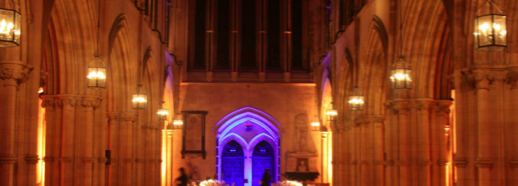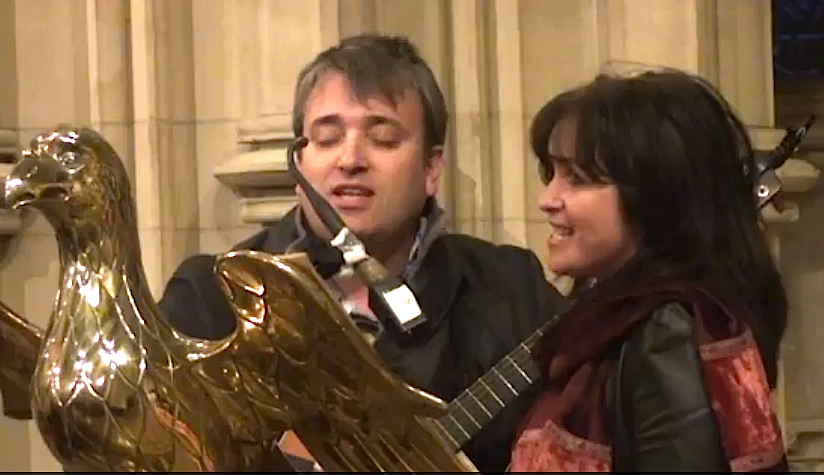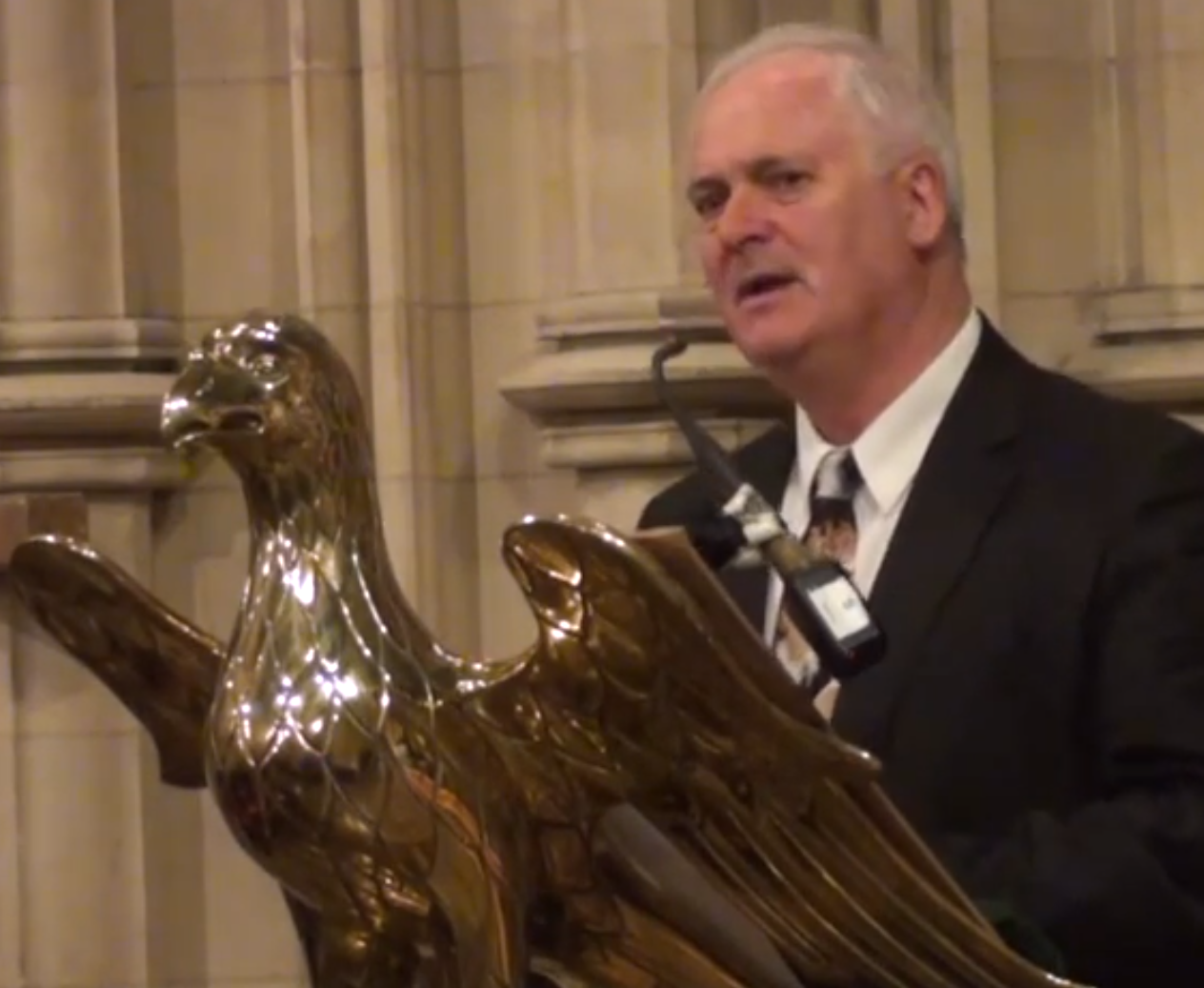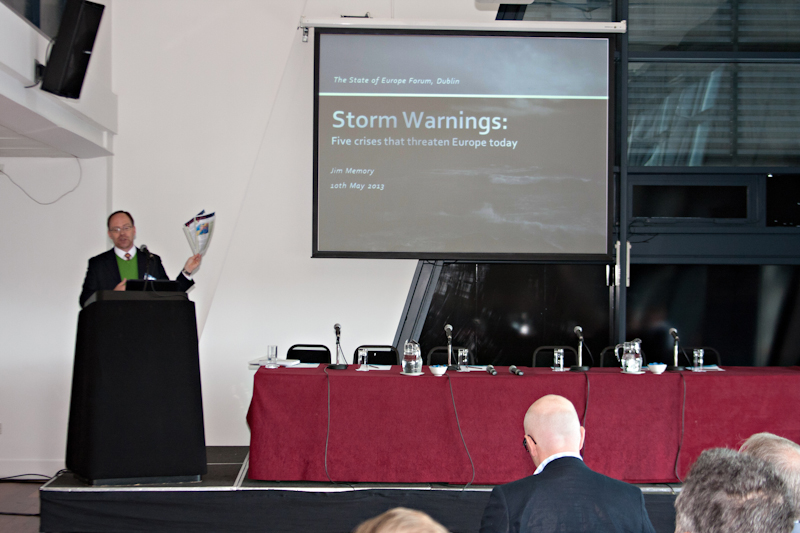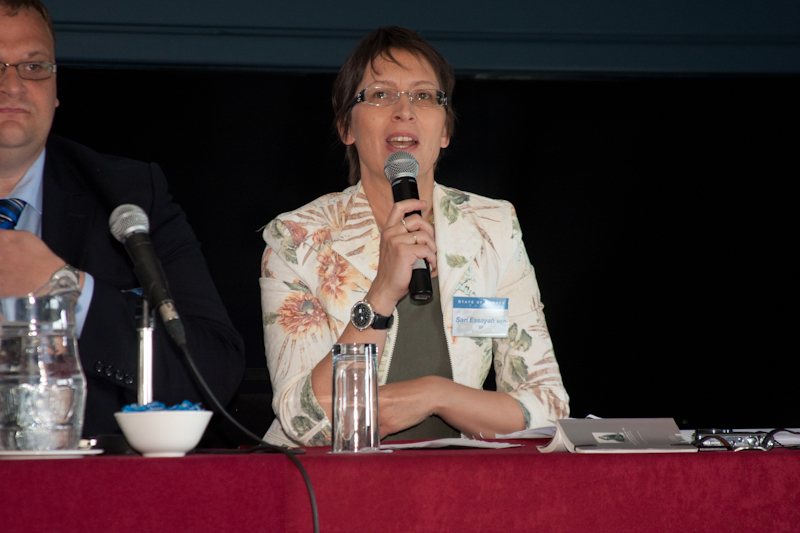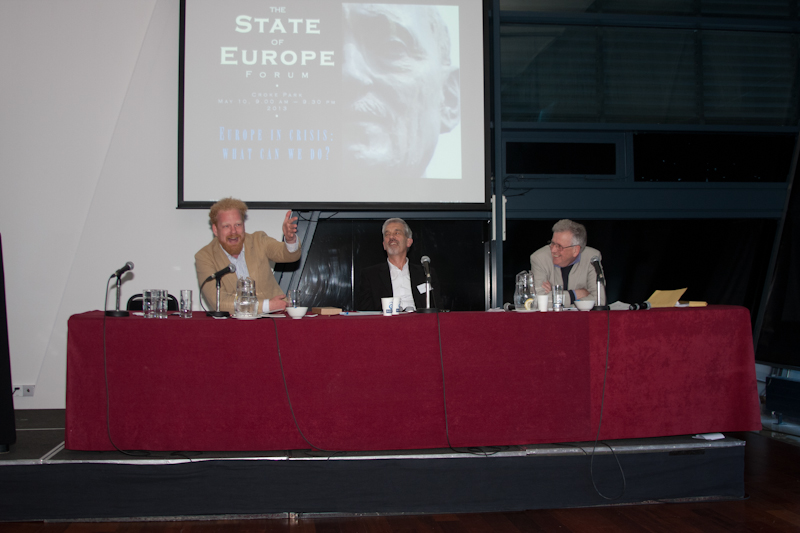The 2013 State of Europe Forum was held in Dublin, Europe Day, May 9 & 10, during the Irish Presidency of the EU, in Christ Church Cathedral (Thursday evening) and Croke Park (Friday morning, afternoon and evening).
Videos can be viewed here:
Spirit radio podcasts: Ronon Johnston interviews Tomas Sedlacek and Sari Essayah about Europe and the State of Europe Forum
Thursday May 9, 19.30 Christ Church Cathedral
The forum opened with a public gathering on the official anniversary of the birth of the EU, in Christ Church Cathedral.
The forum opened with a public gathering on the official anniversary of the birth of the EU, in Christ Church Cathedral, across the road from the Castle where the official EU meetings were being held. David Quinn of the Iona Institute chaired the Cathedral gathering, with musical contributions from Rónán Johnston Spirit Radio dj, song-writer and musician, and his wife Joanna.
Reported by Ruth Garvey-Williams, VOX Magazine:
Jeff Fountain briefly introduced the forum, explaining the significance of May 9, 1950, for the course of post-war Europe and of the role of Robert Schuman, French foreign minister and acknowledged ‘father of Europe’. –– “Today is Europe Day. Most people would say, “so what?” Christians have every reason to reflect on this day – what is the state of Europe? The theme of our time today is “Europe is in crisis – what can we do?” We live in a remarkable time. We are at risk of losing hard-won freedoms, if we don’t stop to ask ourselves, “What values gave birth to the years of peace we’ve enjoyed?”
Dr Margriet Krijtenburg, who completed her doctorate on Schuman and his faith and worldview suggested that today Schuman would focus on the spiritual and cultural heritage of Europe and would encourage all of us to live the virtues of “humility, sobriety & charity”.
Greek crisis – Katerina Papadopoulos (GR)
The marginalised people are the first to suffer in a time of crisis. Social services have been degraded due to government cuts. Data collected from our homeless centre shows that before the crisis we served 60 meals a night mostly among drug addicts, today we serve 350 meals a night.
Two weeks ago, Finnish MEP Sari Essayah was in Strasbourg and heard the speech by Irish President Michael D Higgins: In a nutshell, he urged us to find the spirit of Europe again. He started by describing the nature of this crisis. This is a crisis of values. People of Europe no longer believe in the founding values of the European Union. He urged us to find those values again. I have heard many political speeches in that hall. I would say that this time, many of us loved the message of that speech.
John Bruton, a former Irish Prime Minister (Taoiseach), 1994-7, who helped transform the Irish economy into the ‘Celtic Tiger’, and served as EU Ambassador to the US, 2004–9, spoke on Recovering vision and values in Europe.
Today there are many parallels with our patron saint. St Patrick arrived here in the 5th century at the time when the Roman Empire was falling apart.
A question of sustainability: Europe’s problem today is not primarily about the euro. The world has changed dramatically. We need to change policies to make our welfare state sustainable. The rate at which we Europeans consume non-replaceable resources such as water and energy is far in excess of other parts of the world. We are reaching the limits.
Austerity of some form is inevitable. Change is always painful and we are going to have to change. Protesting about it not going to make a difference. The choice we have is gradual, planned change which is fair or sudden, drastic change when the money runs out.
We need a European Union because we have becoming increasingly inter-dependent. We need one another if we are to defend one another.
Europe’s weaknesses: The big problem we have as Europeans is we don’t have a single venue where we can, as Europeans, have a conversation about the future. We have 27 different conversations in each member state. Europe needs political legitimacy.
Europe’s strengths: Thanks to its Christian roots, the European civilisation combines faith and reason. There is an appropriate separation between church and state and a habit of compromise that did not exist in September 1939. Even if the EU ceased to exist tomorrow the habits of mind that it created are enduring.
We have a substantial infrastructure – cross border roads, electricity grids, free movement of people – which make the European economy more resilient.
But what is the cement that holds the European union together?
The practical experience of democracy.
Our faith as Christians gives us a reason to be patient. We have a sense that this is not the only life and that we will have to give of ourselves at the end of our lives.
Quoting Pope John Paul II: The centre of Europe is the human person, with his or her unique dignity and inalienable rights. We hold on to this important value.
Our Christian belief gives us a sense that we are stewards of creation and we owe a duty of care to people we can’t see.
What does our Christian faith tell us about how we should cope with problems such as those described in Greece?
Because we have a responsibility to our children and grandchildren, it is not reasonable for us to avoid hardships in our generation resulting from the mistakes we have made. There is a strong Christian argument for not passing on to the next generation debts that we should have paid ourselves, or an environment that is degraded. It is very important that this ethical perspective is brought into the austerity debate.
People asked, “Is this good for my career? Is this good for my promotion prospects? Will it increase profit?” The question they should have asked was, “Is it right? Is it fair?”
That weakness of ethics in banking has led to a depletion of the social capital that is our Christian heritage in Europe.
If people were truly god-fearing in our banks and institutions, this financial crisis would not have happened. We need either to make sure they become god-fearing or that they fear someone else! Measures need to be introduced in companies so every few months, people look back at their decisions and ask themselves, “Was it ethical?” Businesses need to learn from churches and introduce a regular examination of consciences and conduct.
A lot of us are concerned about falling numbers in churches, the good news is we are not alone… political parties are losing members even faster than churches.
Only 2% of Irish people are members of a political party (8% of Finns and 1% of Poles)
People are no-longer associating themselves with communal activities, not just because of a loss of faith, but because they are living more individualistic lives. It is only when a crisis happens, that they remind themselves – we do need one another and we do need faith. Keep the faith and most certainly don’t lose hope!
Os Guinness, descendent of the famous Dublin brewer, proposed that the task of Christians in Europe today was to win back the West in the same way that Europe was won twice before, in Roman times and when the pagan tribes of Europe were Christianised.
In June 1940, Winston Churchill gave one of his most famous speeches. “On the outcome of this battle depends the fate of Christian civilisation.” After the war, it set off a huge debate among Christian thinkers. Were the victors really Christian? What were the prospects for restoring Christian civilisation? They were right about the fragility of Christian civilisation.
What is our role today? I would respectfully say that there is a crisis of faith but it is not just a rise of individualism. Our task is to win back the west to our Lord.
Think of the unlikely relationship Jesus had with culture and civilisation. He made it clear that His kingdom was not of this world.
Jesus didn’t just call individuals but individuals together to live the way of life in common.
When we look at our culture, we hear from the new atheists how religion poisons everything. It is true that Christians have been responsible for some of the greatest evils that have been imposed on the world. But there have also been great legacies – the banning of infanticide, the abolition of the slavery, the civil rights movement, a passion for justice, the rise of universities…
We need to be the champions of human dignity, community, freedom and justice. May we so understand our times and serve God’s purposes that there is a recovery of the integrity and effectiveness of faith right across Europe and that this might make a profound difference to the entire human future.
Economists Tomas Sedlacek and Michael Schluter briefly outlined what they would share in their open session in Croke Park the following evening, at the close of the Forum out: what has been wrong at the foundations of modern economics, and what steps to take towards healthy, relationships-centred economics. Sedlacek, former economic advisor to President Havel of the Czech Republic, is author of the best-selling The Economics of Good and Evil. Schluter, founder of the Relationships Foundation is co-author of The R-Factor and The Jubilee Manifesto.
Donna Magee, the organist, played the Hallelujah Chorus of the Messiah as a recessional. The Messiah was premiered in Dublin in a music hall a literal stone’s throw from the cathedral, by the combined choirs of Christ Church and St Patricks Cathedrals. Written by a German, commissioned by an Englishman, and premiered by the Irish, The Messiah is a very European composition, expressing the faith that made Europe Europe.
 Friday, May 10, Croke Park Conference Centre
Friday, May 10, Croke Park Conference Centre
VOX magazine’s editor Ruth Garvey-Williams brings you this summary of the day’s discussions:
Delegates from 20 countries across Europe gathered at Croke Park Conference centre in Dublin on Friday 10 May for the annual “State of Europe Forum”. Inspired by Robert Schuman’s vision for a “community of peoples deeply rooted in Christian values”, the forum explored economic, political, social, religious and environmental issues in Europe from a broadly Christian perspective.
Soul Food with Gerard Kelly
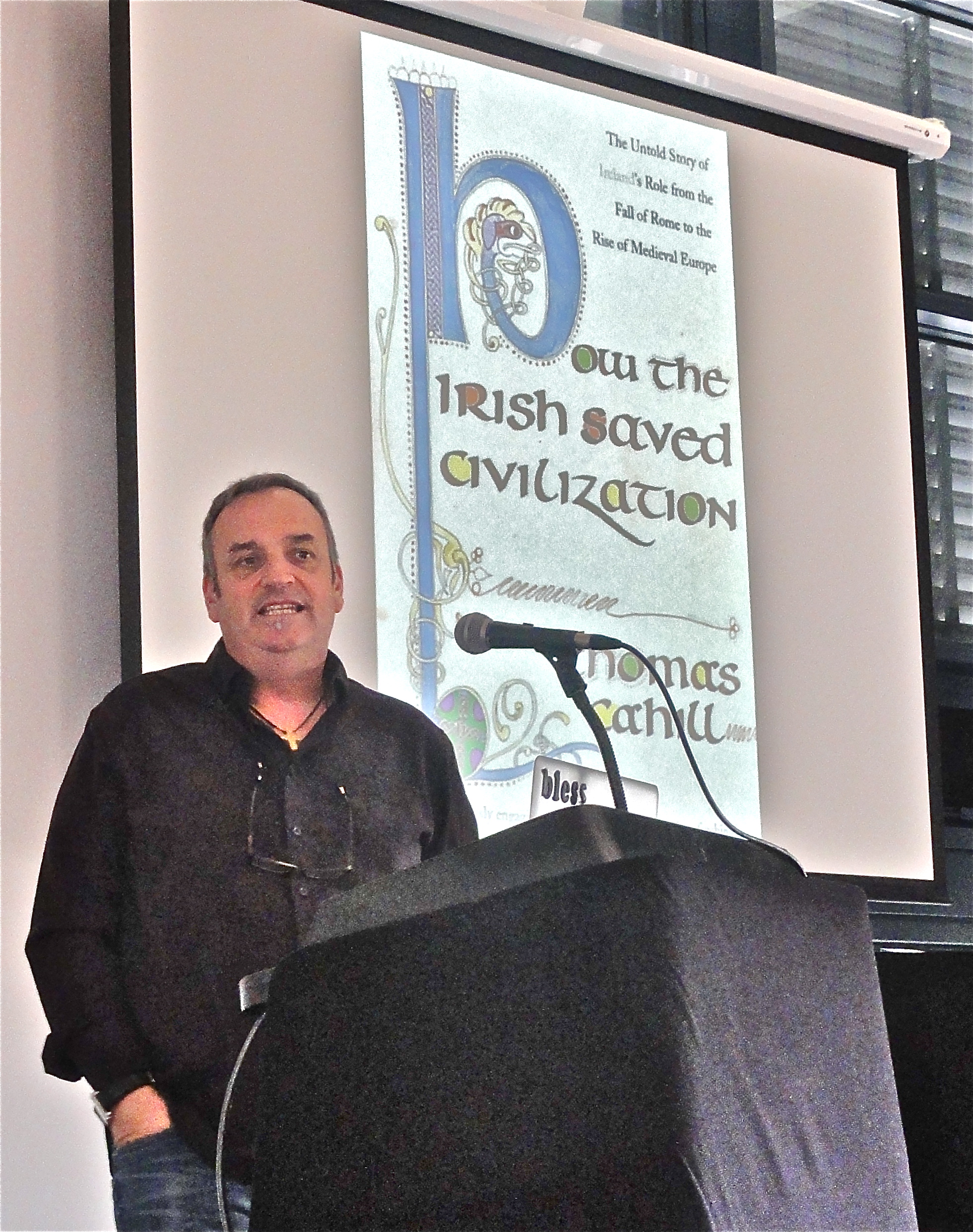
What does it mean that we carry and pass on our stories? Stories create cultures.
“Wherever they went the Irish monks brought with them their books… tied to their waists as signs of triumph just as Irish heroes had once tied their enemies heads. They brought their love of learning… breathed new life in to the exhausted literary culture of Europe.” – Thomas Cahill
On the fringes of the empire, the Irish made the choice to keep the stories alive and that choice helped save the European civilisation. We gather as relatively powerless people of faith but we believe that this story we hold has some power of its own. Can we be a creative minority from the fringes holding together a story…?
The future is birthed in the stories we pass on. The Hebrew understanding of storytelling is not veiled conservatism. You don’t tell stories to your children so that they will be like you but so they will NOT be like you. The story gives to the next generation the capacity, the right and the invitation to engage with God.
Our story is deeply rooted in the past but it moves towards the future. We preserve the story in order to liberate Europe into its future, not keep it in the past. We should be the first to say it cannot be the way it has always been.
We have to deal with the brokenness of humanity. We have to have a faith that robustly addresses the fact that we are broken! When we are left alone we kill each other. The amazing news of Christianity is that in the cross, you bring your brokenness, you are honest about your brokenness and yet you are not destroyed by it.
There is nothing about your brokenness that contradicts the fundamental beauty that God has placed in your life. When people believe God hates them for who they are, we have fundamentally betrayed the gospel. Our brokenness does not take away the fact that we are made and loved by God. We need to learn to communicate beauty and life to people.
Because He is Risen by Gerard Kelly
Because he is risen/ Spring is possible/ In all the cold hard places /Gripped by winter/ And freedom jumps the queue /To take fears place as our focus/ Because he is risen
Because he is risen /My future is an epic novel /Where once it was a mere short story/ My contract on life is renewed in perpetuity/ My options are open-ended /My travel plans are cosmic /Because he is risen
Because he is risen/ Healing is on order and assured /And every disability will bow /Before the endless dance of his ability /And my grave too will open /When my life is restored /For this frail and fragile body /Will not be the final word on my condition/ Because he is risen
Because He is risen /Hunger will go begging in the streets/ For want of a home /And selfishness will have a shortened shelf-life/ And we will throng to the funeral of famine/ And dance on the callous grave of war /And poverty will be history in our history /Because He is risen
And because He is risen /A fire burns in my bones /And my eyes see possibilities/ And my heart hears hope /Like a whisper on the wind/ And the song that rises in me /Will not be silenced /As life disrupts this shadowed place of death/ Like a butterfly under the skin/ And death itself/ Runs terrified to hide /Because He is risen
The Relational State of Europe snapshot – Jonathan Tame
In the last 20 years, the major goal of most nations in Europe has been economic growth but this is coming to an end. Evaluating of GDP, Robert Kennedy said, “It measures everything, in short, except that which makes life worthwhile.”
What should life revolve around? Individualism says it revolves around me. In the economy it revolves around money. We want to suggest that there is a way of structuring society around good and right relationships.
The society we live in is the sum total of the quality of our relationships. What if we really understood that relational capital is more important that financial capital? What if we realised that time is the currency of relationships? We all have exactly the same amount of time. That time can be spent on investing in relational and social capital, which can enrich us. “Get rich relationally” is the key message for the church.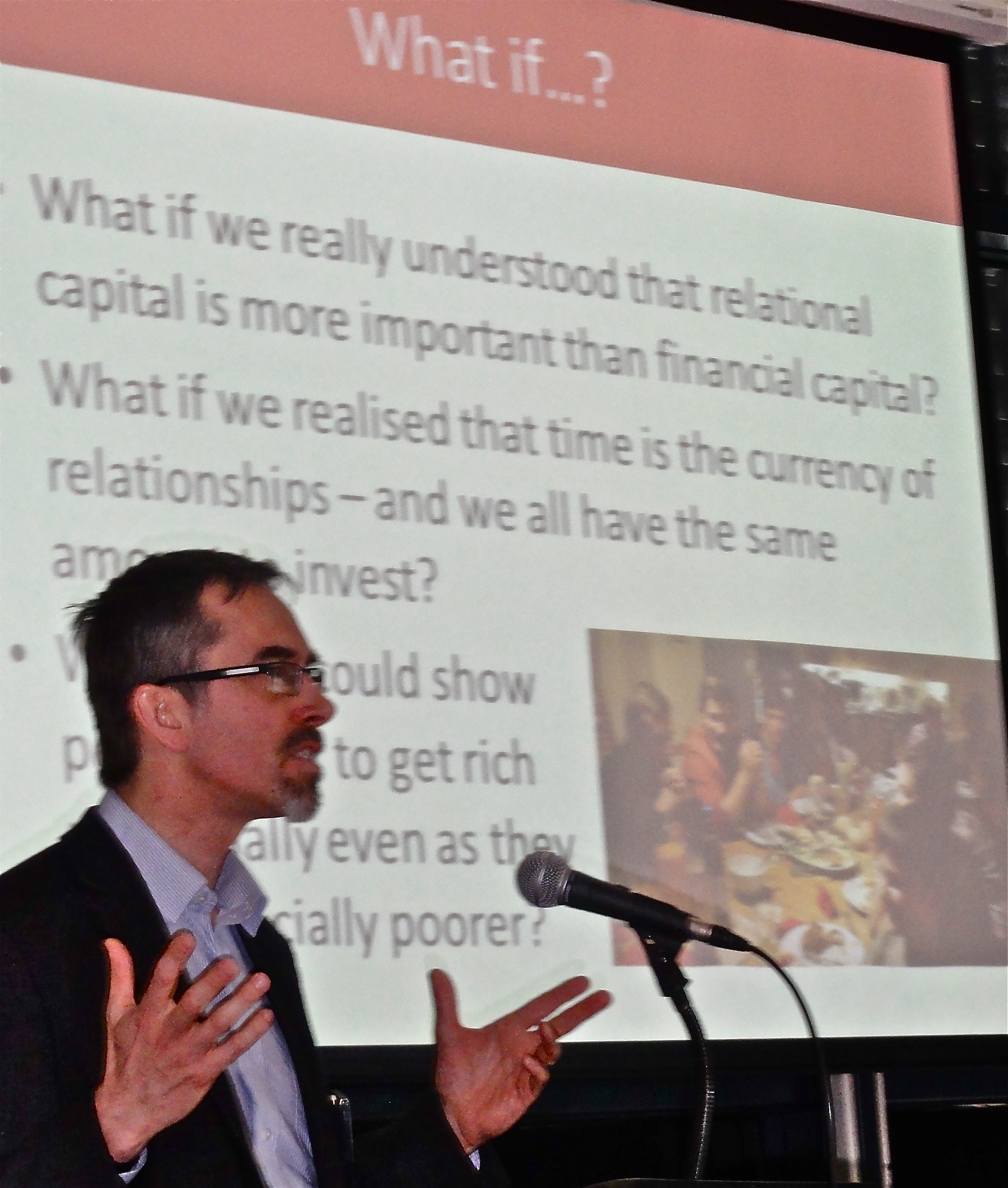
Download the 18-page report here.
Storm Warnings: Five crises that threaten Europe today – Jim Memory
We are sailing on uncharted waters and we need help to orient ourselves. Sailors listen to the shipping forecast to find out what is ahead
I believe that to be a Christian engaged in life in Europe today we need to understand what is happening in our societies, in the economy, in politics and in the environment.
The Economic Storm: it is five years since the first echoes of the collapse in 2008. The consequences are evident. In Italy, Spain, Portugal, Greece and Ireland there are paralyzing levels of debt. Measures have saved the banks but at the price of capital control. These nations have experienced all the pain but none of the gain of devaluation. Unemployment is at frightening levels. Ireland is held up as the “poster boy” of doing things right and taking austerity on the chin.
Central and Eastern Europe is deeply indebted and suffering from the collapse of the export market. France is in real danger of going into a deep depression because of high level of government debt.
Northern Central Europe is suffering from a savings glut. Germany businesses have done well but individuals have not experienced the same prosperity.
Four possible scenarios
Maintain the status quo – 10 to 20 years of low or even negative economic growth. Turning the current crisis into the new normal.
Disorderly breakup of the Euro – devastating to countries such as the “club med” grouping
Structured break up – certain countries invited to leave and supported through the transition.
Full fiscal union – unlikely that it would be acceptable to the whole EU.
The Political Storm: There is high pressure over the EU. The long period of political stability in Europe may be over. Popular levels of trust in the EU have reached record lows. There has been a rise in nationalist, populist and xenophobic movements. Extreme right wing politicians tap into rising unrest.
The Social Storm: Migration – The secular European identity simply does not know how to handle religions, which refuse to bow at its secular altar. There are 6.7% of migrants in the EU. States have experimented with models of integration but without great success.
Demographic Change – all EU states have a fertility rate below the replacement level. By 2060, 33% of Germans will be over 65 and the average Italian will be over 50. This will have devastating impact on population figures and an aging population will add major strain to social welfare systems, etc.
The Environmental Storm: No-one is talking about this because of the economic storm. The summer ice in the Antarctic is melting. Sea levels have risen by 11mm. Extreme weather is becoming more common. In the UK, four of the five wettest years in history have happened in the last 12 years. The weather is getting more and more unpredictable.
The Religious Storm: Faith refuses to leave the stage despite predictions of its demise. Europe is becoming more secular and more religious. Younger generations are more open to religious identification (although not in traditional forms).
The reason why we find so little practice of faith in Europe is because people have put their faith elsewhere (“prosperity”). The message is, “If we can return to economic growth, we will return to security and prosperity.” …I think not.
Is there hope for Europe?
Predictions –
A long period of economic stagnation
A reduced Eurozone
The east and south will provide migrant workers for the prosperous north
EU expansion continues but also suffers some losses
Countries in the east may start to look to Russia again
The UK will either leave the EU or renegotiate its status
Independence of new states will slow down EU decision-making
Demographic changes will create inter-generational conflicts (younger generation railing against the old)
Age-related migration
Extreme weather will become the norm
Higher CO2 levels will boost food and forest growth in higher northern latitudes.
A resurgence of religiosity
Mission in Europe
Economic stagnation poses real problems for resource-dependent churches
Chronic unemployment means “business as mission” becomes of the primary avenues for bringing Christian hope
Communal living / new monastic orders
Social justice, simplicity and sustainability will become key issues
Care for the elderly will be a vital part of Christian mission
The church will be one of the few intergenerational communities
Environmental initiatives will move from the margin to the mainstream
Secularism, Islam and Christianity will compete in offering hope to a re-sacralised Europe
New types of Christian community will emerge
Comments and Feedback – panel discussion
Tomas Sedlacek, Economist – Czech Republic
I tend to be more optimistic. While on the surface it seems like we are falling apart, the integration process in Europe is faster than before. We are seriously trying to help the Greeks.
Dr Michael Schluter, Economist – UK
I’m a little less sanguine. Because of exchange rates, the Euro is a massive injustice to the countries of southern Europe at the expense of the country in northern Europe.
Sari Essayah, MEP – Finland
John Bruton said that political parties are no longer popular. It is not “cool” to be a member of a political party. Nowadays, parties try to sell ideologies to gain votes. That is what is causing the political crisis in Europe. It is going to be very crowded in the political centre. We should be bold enough to stick to our political ideologies instead of swinging from one side to another side in order to attract voters.
David Quinn – Ireland
Ireland is considered to be a model country in terms of austerity. We have the old traditional Irish safety valve of emigration (300,000 in the last three years). We had huge inward migration during the Celtic Tiger with little anti-immigration rhetoric. What the political future holds for Ireland is uncertain but austerity will continue. The debt levels are worse than they seem.
Christel Lamère Ngnambi – Brussels
Brussels is the hometown of the main institutions of the EU but it is also the capital of Belgium. The political culture in Europe has evolved more towards a culture of consensus building. The culture of consensus has influenced the way Europe is working and the way people in the EU institutions tackle our current challenges. The debates in Brussels are less fearful than those in the media.
The European project has instilled a sense of care for one another. For me that is one reason for hope. There are reasons to worry: the increasing problem of intolerance and negative reactions to diversity. The way we envisage migration and integration of foreigners is sometimes worrying.
The ideology that inhabits Europe is a trust in welfare and material prosperity. Someone needs to show an alternative. We need churches and organisations that embody the values of the gospel as an alternative to the “idols” that inhabit the hearts of Europeans.
Leo von Doesburg – European Christian Political Movement (Specialty in Central / Easter Europe)
I missed one crucial facet in the analysis: the moral crisis. A new global ethics has been formed in which individual freedom is the basis for the philosophy. This has as a consequence that institutions and communities are breaking down. This global ethic has become transferred into “rights”. The meaning of words such as dignity and equality are being changed.
Dr Thomas Schirrmacher – Germany
We need to recover the sense of European solidarity. The blame game is so unhelpful. We all have to be able and willing to share in a solution. The church has a role in this too. The church one of the few institutions that crosses the social and class divides.
The council of Europe in Strasbourg presented the demographic trends (falling fertility rates). We have a crisis of a willingness commit and have children. We have to take a leaf out of the environmental movement. When a species is endangered, there is usually a problem with the habitat. We have degraded the family and we are under threat!
Antonie Fountain – The Netherlands
Advocacy is vital. We need to be out there speaking out but not just on the traditional subjects. The minute a Christian speaks out on abortion and marriage people stop listening. We need to start putting our voices where we can make a real difference. Our acts of mercy and justice have been strong. What does it mean to be pro-life in terms of peace building, inequality of wealth and income, etc.? Those things are all inter-twined. The question is not if the current things will change, they will. It is not even a question of when. The question is how. We spend so much time thinking of what we once had. We need to look forward with hope.
Fotis Romeos – Greece
We are people – people with families who have lost their jobs. 1.5 million Greek people are unemployed. It is a huge number for a small country. We want to talk about solidarity and unity in Europe. We have people who are homeless but they still have their laptop because there is free internet in the centre of Athens. They are surfing the web looking for jobs in other parts of the world.
Julia Doxat-Purser – UK
Our politicians don’t know how to cope with our plural societies. Some politicians want everybody to be secular. Others want everyone to be Christian. The church is disorientated, confused and afraid. We have to be more confidence in the gospel. We have to help our politicians see that Europe has changed. You cannot force everyone to have the same view. We all need to have the space to be ourselves: not to compromise and to disagree with respect.
Europeans don’t know who they are any more. If we talk about Christian values, that is not enough. We need to unpack these values and expand people’s understanding. What are the true values? Respect, shalom, compassion, patience… We need to be people of hope. We are a plural society and that is the way it is going to stay. We need to help our politicians adapt.
Workshop:
Children and Youth – led by Harry Bryans
What is happening with the 112 million European children and 90 million youth (15 – 25)?
Global Report on the spiritual state of the world’s children and youth surveyed 160,000 children in 40 countries on a range of issues around family, life choices and religious belief.
16% had thought about committing suicide
17% (teenagers under 15) up to 30% (teenagers over 15) had already experienced sexual intimacy
52% admitted to having lied, 32% to having cheated
68% said they spent less than 1 hour a week talking with their father
Youth spent majority of their time investing in music, film, internet, chat, sms
Four out of every five young people were leaving the church. “Unbelief” is the fastest growing “religion” of our day. If we are losing 80% of our young people then there is something fundamentally dysfunctional in the way we are disciplining from one generation to the next
Telling tweet from an Irish teenager: “All I want in life is to get a high-five off of Todd from Scrubs” – Michael, age 15.
Free children’s work resource available from: www.max7.org
Comments (Children and Youth) issues:
I think the crisis of young people is more of a reflection of the crisis that we are seeing in their parents. What hope do the children have if there is not the support from the family and the home?
Young people are so tired of “fixed” answers… they need to have a safe place to discuss and think. The church does not provide a place for them to be creative and to think differently. As churches we need to allow for the coming together for relationship, sharing, encouragement and support.
A fundamental change has taken place in society. Older generations were used to being loyal to organisations.
A child learns not by hearing good words but by seeing models. How do we as adults live our Christian life? How much does this gospel mean to me? Which gospel do I hand over to the children? I came from a church that did not speak truth about life so I wasn’t prepared for real life.
The Church and the crises in Europe – panel session
Ireland: A Church in Crisis? – David Quinn
The combination of the clerical sex abuse crisis and a backlash against the previous authoritarianism when the church was dominant means the Catholic Church in Ireland has a lot to live down.
Ireland in its relationship with the Catholic Church is similar to its relationship with Britain after independence.
It took 100 years for a reigning British monarch to come back to Ireland (2012) and a lot had to be put right before that could happen. It will take a long time to normalize relationships with the church.
However, 35% of Irish people still go to mass every week with another 15% attending on a monthly basis.
The crisis is not just affecting the churches but there is a general suspicion of “institution” with newspaper readership is down drastically.
The Catholic Church in Ireland doesn’t have a growth mentality. The average parish priest is concerned about maintenance. In the past, social convention brought people through the door. Now social convention is having the opposite effect. A new mentality is needed. Nothing has been done to encourage people to join the priesthood. The result is a significant decline in vocations.
Most parishes in Ireland have no growth programme whatsoever and they are wondering why numbers coming to mass are declining. There is really no substitute for hard work.
In Ireland when people think of Christianity, they think of the Bishops (Institutional Catholicism) yet when people think of football they don’t think of UEFA, they think of the game itself and maybe the players. When people get browned off with the bishops, they stop going to church. If someone is angry at UEFA, they don’t stop playing football.
Working together during the Greek Crisis – Fotis Romeos/John and Katerina Papadopoulos
During the crisis, we had good examples of people working together from different denominations and churches. In Greek, it is a huge challenge to have the state church (Orthodox) work with any others. But despite of this we have seen tremendous initiatives of working together. The Greek bible society has many Othodox priests on the executive board sitting at the same table as leaders from other denominations. We are not where we wish we could be but we are not where we have been yesterday.
The importance of church in the “micro” – Gerard Kelly
It is so important to consider the micro. That’s where churches deal with real people and that has to be where the gospel lives. We can have a Christian engagement with the macro but if our capacity to engage in the micro declines too far then the big issues are meaningless.
There is no reason why we cannot be committed both to church planting and to church renewal. The fact that those two groups of people are not speaking to each other is “barmy” [ridiculous]. There should be a passion for both those things to happen. If some of our ambitions and dreams are to be fulfilled, we need the Christian movement to grow on the ground.
I don’t think we can seriously talk about growing the church unless we commit to spend more time talking and listening with people. Jesus instituted a meal with his friends as the central yet this has been turned into a religious activity.
The most spiritual inquisitive generation in the history of Europe is not attending our churches. We have to re-connect with people. The macro can only succeed if we are seeing real growth and connection with people at the micro level.
Evening public meeting:Is there hope for Europe after capitalism?
Restoring the soul of economics – Dr Tomas Sedlacek
The most broken commandment is the “Sabbath rest”. The ethics or religion of efficiency is so deeply embedded into our lives that we rest in order to be more efficient. The seventh day was not about working more efficiently but about “rest”.
Although it pretends that it is ethic-less, Economics does have a strong code of ethics. Anybody who has studied in economics needs to be a believer in certain things. At times the sets of beliefs, which underpin economics, supply the role of a religion.
The home run of any ideology is when we no longer consider it an ideology but we accept it as truth. It is easier to imagine the end of the world than the end of capitalism. The ideology is so deeply embedded that it seems to be a fact.
There was an almost “religious” reaction to the economic crisis. How is it possible that something we believed to be almost divine, has been shown to be wrong? How could this happen? Why are we denied the opportunity to grow?
Too many of the assumptions around Economics have been accepted as “truth”. That is the moment where we rational people start believing the myths we have created. Like the Pharisees that began believing the rules that they created.
In the story of the “Lord of the Rings”, the first question you have to ask yourself is, “Who is the Lord of the Rings”. Who does the ring answer to? Sauron seems to be the obvious case. The ring was created to help Sauron to subdue Middle Earth but towards the end of the trilogy, you discover that when you destroy that little thing the whole of Mordor gets destroyed. Something that was supposed to serve its master, ends up enslaving and destroying its master.
This is what happens with the body of economics. We have become slaves.
Re-thinking economic relationships – Dr Michael Schluter
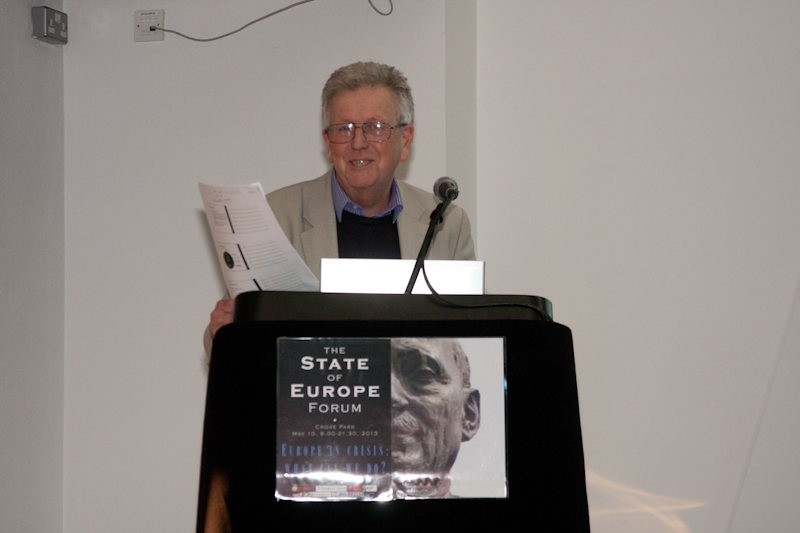
I want to present an alternative framework for reviving the present situation in Europe. We have to re-cast economics issues in terms of relationships. My fundamental starting point is that I think Christianity is a relational religion. Relationships precede the physical world. Jesus provided us with a pattern of perfect relationships – he was the perfect relational person. The cross is a relational event (reconciliation).
We have become so embedded into an individualistic way of thinking that we miss so much of what is being said in the Bible. Every verse of the epistles is about relationships. Look again at the teaching of Jesus.
God’s interest is not confined to personal relationships. His interest is in all relationships. Too often we individualise the New Testament and rule out collective response. All of us are collectively responsible for the system failure we’ve seen in Europe.
Behind every economic transaction lies a relationship. God is concerned about the price that is paid for milk by the large supermarket chains – a price that is kept low because of the power of the supermarkets.
We talk about developing countries and developed countries. What you meant by a developed country was a “rich” country. Is the US a “developed” country? Which country has the most divorce, loneliness, etc.? 40% of Americans over 45 will self-describe as being chronically lonely. Loneliness is a sign of relational poverty. From a relational point of view, America would not be a developed country.
Capitalism is an exclusively materialistic vision. It is looking the wrong way. Human happiness and wellbeing does not come from income and wealth but it comes from the quality of their relationships. Markets are simply human creations.
Why is it that Christians are not shouting about the pay differentials? Probably because we are too middle class. We are not feeling the pain of low salaries. We need to feel the pain of people who live without knowing how they are going to pay their bills while others are taking huge salaries.
Renewing relationships
Between nation and nation in the Eurozone – If you want to correct the unemployment for those in Spain and Greece, we have got to deconstruct the Euro. There is no way we can transfer enough money to these countries. While Greece and Spain remain in the Euro, they are going to suffer appalling unemployment.
Between generations – We have borrowed a gigantic amount of money that our children are going to have to pay back. Don’t you think that is an act of gross injustice? One suggestion is we could address the balance by creating a Jubilee for student debt. Maybe we could put a tax on all homes that are over £1 million? We have to find ways that the older people can pay money back so we are not landing this debt on our children.
The investor and the user of funds – If you charge interest, you are reaping what you haven’t sown. Do we see investing as any different from putting money in a casino? Shareholders are meant to hold directors to account. We need to call for people to engage with where they invested. Why didn’t you track your money and know where it was spent? We need to know where our savings are going and that they are used properly. We need to hold managers to account.
Banks and Taxpayers – why doesn’t God like debt? It upsets parity. God is interested in mutual respect to prevent an abuse of power. The borrower is the slave of the lender. The lender has the power in an unhealthy way. God does not like debt and God makes it so that it is very unattractive to lend. Banks have been lending up to 70 x their share capital… if even 3% of their loans go wrong all of their share capital is wiped out. There is an implicit guarantee from governments that they will always bail out the banks. The maximum leverage the banks should use, should be reduced from 33x down to 25x… reduce it down to 10x or 5x because otherwise all you are doing is putting at risk the money from the taxpayers.
Between city-regions in the global economy – the future of the global economy, cities around the world are going to compete. We need to develop centres of excellence in each of the major cities and towns of Europe so that universities and education and research is focused in specific
Response:Gerard O’Neill – Amárach Consulting
I have been asked give an Irish response. If I was to try and capture it, perhaps what we need now in Europe is a second reformation. As someone who grew up a Catholic in Northern Ireland I don’t say that lightly (we had enough problems with the first reformation!).
There is a disenchantment with the “goods life”, with economics and the politicians who have promoted the mantra of growth. We’ve seen market failures and crony capitalism. Economics has become a religion and the loss of our “faith” has left us stranded, disillusioned and enslaved.
We are trapped in the present because we’ve lost the connections with previous generations and the faiths that saw us through the difficult times in the past. The crises in Europe mean that a lot of what we had gotten used to is coming to an end.
What would a second reformation do?
Renewal – one of the tasks for Christianity in Europe is to fill the gaps that will emerge. We need to see a renewal of the things we used to have: Family. Community. Church.
Resilience – we need a system that doesn’t freeze. Real markets based on the real needs rather than the speculative needs. Part of resilience is about real values and beliefs. The unique Christian belief that we are children of God; we are the same in the eyes of the creator of the universe and the real solidarity comes from that. We need the values of the “good” life not the “goods” life.
Relations – we need to renew relationships in the light of Christian teachings. Relations between men and women. Real relations based on love not debt. And of course our relations with God. We are, after all, spiritual beings.
